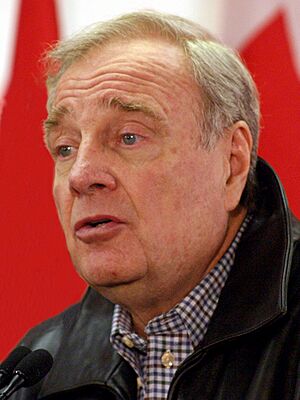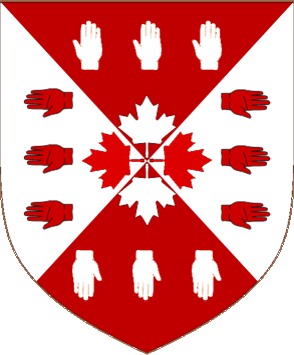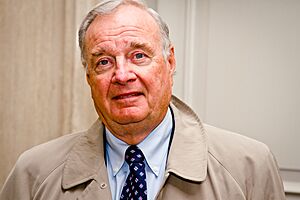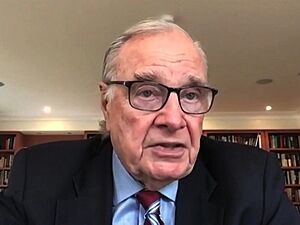Paul Martin facts for kids
Quick facts for kids
Paul Martin
|
|||||||||||||||||||||||||
|---|---|---|---|---|---|---|---|---|---|---|---|---|---|---|---|---|---|---|---|---|---|---|---|---|---|

Martin in 2006
|
|||||||||||||||||||||||||
| 21st Prime Minister of Canada | |||||||||||||||||||||||||
| In office December 12, 2003 – February 6, 2006 |
|||||||||||||||||||||||||
| Monarch | Elizabeth II | ||||||||||||||||||||||||
| Governor General | |||||||||||||||||||||||||
| Deputy | Anne McLellan | ||||||||||||||||||||||||
| Preceded by | Jean Chrétien | ||||||||||||||||||||||||
| Succeeded by | Stephen Harper | ||||||||||||||||||||||||
| Leader of the Liberal Party | |||||||||||||||||||||||||
| In office November 14, 2003 – March 19, 2006 |
|||||||||||||||||||||||||
| Preceded by | Jean Chrétien | ||||||||||||||||||||||||
| Succeeded by | Bill Graham (interim) | ||||||||||||||||||||||||
|
|||||||||||||||||||||||||
| Member of Parliament for LaSalle—Émard |
|||||||||||||||||||||||||
| In office November 21, 1988 – October 14, 2008 |
|||||||||||||||||||||||||
| Preceded by | Riding established | ||||||||||||||||||||||||
| Succeeded by | Lise Zarac | ||||||||||||||||||||||||
| Personal details | |||||||||||||||||||||||||
| Born |
Paul Edgar Philippe Martin
August 28, 1938 Windsor, Ontario, Canada |
||||||||||||||||||||||||
| Political party | Liberal | ||||||||||||||||||||||||
| Spouse |
Sheila Cowan
(m. 1965) |
||||||||||||||||||||||||
| Children | 3 | ||||||||||||||||||||||||
| Parents |
|
||||||||||||||||||||||||
| Residences | Knowlton, Quebec, Canada | ||||||||||||||||||||||||
| Alma mater | University of Toronto (BA, LLB) | ||||||||||||||||||||||||
| Profession |
|
||||||||||||||||||||||||
| Signature |  |
||||||||||||||||||||||||
Paul Edgar Philippe Martin, also known as Paul Martin Jr., is a Canadian lawyer and retired politician. He served as the 21st Prime Minister of Canada and the leader of the Liberal Party of Canada from 2003 to 2006.
Before becoming Prime Minister, Martin was a successful businessman. He also served as Canada's Minister of Finance for many years. During his time in politics, he helped shape Canada's economy and made important decisions about social programs and international relations.
Contents
- Paul Martin: Canada's 21st Prime Minister
- Early Life and Education
- Starting a Business Career
- Early Steps in Politics (1988–1993)
- Serving as Finance Minister (1993–2002)
- Becoming Prime Minister of Canada
- Prime Minister of Canada (2003–2006)
- After the Prime Ministership (2006–2008)
- Life After Politics (2008–Present)
- Honours and Awards
- University Degrees and Recognition
- See also
Paul Martin: Canada's 21st Prime Minister
Early Life and Education
Growing Up in Canada
Paul Martin was born on August 28, 1938, in Windsor, Ontario. He spent his childhood in both Windsor and Ottawa. His father, Paul Martin Sr., was a very important politician who served in the Canadian Parliament for 33 years. His mother was Eleanor Alice Adams. Paul Martin Jr. had one sister, Mary-Anne Bellamy. When he was eight years old, in 1946, he had polio, a serious illness, just like his father had experienced earlier.
University Years
Martin first attended the University of Ottawa. He then transferred to the University of Toronto, where he earned a Bachelor of Arts degree in history and philosophy in 1961. After that, he studied law at the University of Toronto Faculty of Law and became a lawyer in 1966.
On September 11, 1965, Paul Martin married Sheila Ann Cowan. They have three sons named Paul, Jamie, and David.
Starting a Business Career
Joining Canada Steamship Lines
In 1969, a company called Power Corporation took control of Canada Steamship Lines (CSL). In 1970, Paul Martin, who was 32 years old, was appointed to CSL's board of directors.
Leading a Company
In 1973, Martin became the president and Chief Executive Officer (CEO) of the CSL Group. The company faced some challenges during this time, including unexpected costs for building ships and a strike. In 1976, CSL became an operating division of Power Corporation.
Early Steps in Politics (1988–1993)
Becoming a Member of Parliament
In 1988, Paul Martin was elected as a Member of Parliament (MP) for the area of LaSalle—Émard in Montreal. He was re-elected easily in every election that followed until he retired from politics.
Seeking Party Leadership
In 1990, Martin ran to become the leader of the Liberal Party. However, he lost to Jean Chrétien in a close and competitive race. This election created a long-lasting political rivalry between the two men.
After this, Martin helped write the Liberal Party's plan for the next election, which was often called the "Red Book." The Liberal Party won a large majority in the 1993 election.
Serving as Finance Minister (1993–2002)
Fixing Canada's Finances
After the Liberals formed the government, Prime Minister Chrétien chose Paul Martin to be the Minister of Finance. At that time, Canada had a very large government debt compared to other wealthy countries.
As Finance Minister, Martin made big changes to how the government spent money. He cut spending and reformed various programs. These actions helped Canada eliminate its government debt by 1998, which was a major achievement. By 2002, Canada's financial health was much stronger.
Improving the Canada Pension Plan
During his time as Finance Minister, Martin also worked to improve the Canada Pension Plan (CPP). This plan helps Canadians save money for their retirement. He held meetings with finance ministers from all the provinces and led a public discussion process. These efforts led to important changes that made the CPP more secure for the future.
Working with Prime Minister Chrétien
Paul Martin and Prime Minister Chrétien often had different ideas and sometimes disagreed while working in government. Their political rivalry, which began during the 1990 leadership race, continued throughout their time in office.
By 2002, their disagreements became very strong. Martin left his role as Finance Minister. Soon after, he announced his intention to run for leader of the Liberal Party again. Prime Minister Chrétien then announced he would retire, which led to a new leadership election in 2003.
Becoming Prime Minister of Canada
Winning the Liberal Leadership
In the fall of 2003, the Liberal Party held a convention to choose its new leader. Paul Martin won the leadership by a large margin, with 93 percent of the party delegates supporting him. He officially became the leader of the Liberal Party on November 14, 2003.
Taking Office as Prime Minister
In December 2003, Paul Martin was sworn in as the 21st Prime Minister of Canada. He took on the important role of leading the country.
Prime Minister of Canada (2003–2006)
Leading a Minority Government
In the 2004 federal election, Paul Martin led the Liberal Party to victory. However, they formed a minority government, meaning they had fewer seats than all other parties combined. This required them to work with other parties to pass laws. This outcome was partly due to public concerns about how government money was managed, which became known as the Sponsorship Scandal.
Important Policies and Decisions
Boosting Healthcare Funding
In September 2004, Martin's government reached an important agreement with the leaders of Canada's provinces. This plan promised an additional $18 billion in funding for healthcare over 10 years, aiming to improve health services across the country.
Supporting Indigenous Peoples
In November 2005, the Martin government reached a historic agreement with Canada's provinces, territories, and Indigenous groups. This agreement, known as the Kelowna Accord, aimed to close the gaps between Indigenous and non-Indigenous Canadians in areas like health, education, housing, and job opportunities.
Changing Marriage Laws
A significant issue during Martin's time as Prime Minister was marriage laws. Martin changed his view on the topic in 2004, believing it was a matter of human rights. In 2005, his government proposed a bill to allow all couples to marry across Canada. The Civil Marriage Act was passed in July 2005, making Canada one of the first countries in the world to recognize equal marriage rights.
Canada's Role in the World

Martin's government decided that Canada would not participate in the American National Missile Defense Program. However, Canada continued to cooperate closely with the United States on other important issues, such as border control and defense.
He also promoted the idea of expanding the G8 group of leading countries into a larger group of twenty nations, known as the G20. Martin was the first chairman of this new group. He also worked to build a stronger relationship between Canada and the People's Republic of China.
Appointing a Governor General
On August 4, 2005, the government announced that Martin had advised Queen Elizabeth II to appoint Michaëlle Jean as the Governor General of Canada. She became the Queen's representative in Canada.
The End of His Term
In 2005, new details emerged from an inquiry into the Sponsorship Scandal, which raised more questions about government spending. Opposition parties in the Canadian Parliament expressed their disagreement with the government's handling of these issues.
On November 28, 2005, the opposition parties passed a vote against Martin's government. This meant that an election had to be called.
The 2006 Federal Election
The federal election was held on January 23, 2006. During the campaign, the Liberal Party faced challenges, and public support decreased.
In the end, the newly unified Conservative Party, led by Stephen Harper, won the most seats, though not a majority. This election ended over 12 years of Liberal rule in Canada.
Shortly after the election results were clear, Paul Martin announced that he would step down as the leader of the Liberal Party. He continued to serve as a Member of Parliament for his riding of LaSalle—Émard but did not run for re-election in 2008.
After the Prime Ministership (2006–2008)
Returning to Parliament
After leaving the Prime Minister's office, Paul Martin chose not to become the official Leader of the Opposition. Instead, he stepped down as the Liberal Party's parliamentary leader on February 1, 2006. Bill Graham was appointed as his interim successor. Martin officially resigned as Liberal Party leader in March 2006.
Focusing on Special Projects
During his last years in public office, Martin dedicated his time to projects aimed at improving educational opportunities for Indigenous peoples through the Martin Aboriginal Education Initiative. He also worked on protecting the Congo Basin rainforest. In the 2008 federal election, Martin did not seek re-election to Parliament.
Life After Politics (2008–Present)
Writing Memoirs and Global Work
Since retiring from active Canadian politics in 2008, Paul Martin has continued to be involved in important global work.
He published his memoirs, Hell Or High Water: My Life In And Out of Politics, in late 2008.
He has been asked by international leaders, including Kofi Annan (former Secretary-General of the United Nations) and Gordon Brown (former Prime Minister of the United Kingdom), to help African countries develop their economies.
Continuing to Help Others
In 2009, Martin became co-chair of the Congo Basin Forest Fund, working with Nobel Peace Prize winner Professor Wangari Maathai. This fund addresses issues of global warming and poverty in a ten-nation region in Africa.
After his retirement, Martin also served as an adviser to the International Monetary Fund and the Coalition for Dialogue on Africa. He continues his work with the Martin Family Initiative, which supports Indigenous youth. He lives in Knowlton, Quebec.
In September 2022, Martin attended Queen Elizabeth II's state funeral.
Honours and Awards
Paul Martin has received many honours for his public service and contributions to Canada.
| Ribbon | Description | Notes |
| Companion of the Order of Canada (C.C.) |
|
|
| 125th Anniversary of the Confederation of Canada Medal |
|
|
| Queen Elizabeth II Golden Jubilee Medal for Canada |
|
|
| Queen Elizabeth II Diamond Jubilee Medal for Canada |
|
- He received the prenominal title "The Honourable" and postnominal "PC" for life when he became a member of the Queen's Privy Council for Canada on November 4, 1993.
- His prenominal title was upgraded to "The Right Honourable" for life when he became Prime Minister on December 12, 2003.
 |
|
A Trillium-class freighter in Canada Steamship Lines, named Rt. Hon. Paul E. Martin, is named after him.
University Degrees and Recognition
Paul Martin has received many honorary degrees from universities across Canada and internationally. These degrees recognize his significant contributions to society and public service.
| Location | Date | School | Degree |
|---|---|---|---|
| November 1998 | Concordia University | Doctor of Laws (LL.D) | |
| June 2001 | Wilfrid Laurier University | Doctor of Laws (LL.D) | |
| June 14, 2007 | University of Windsor | Doctor of Laws (LL.D) | |
| May 30, 2009 | Bishop's University | Doctor of Civil Law (DCL) | |
| May 28, 2010 | Queen's University | Doctor of Laws (LL.D) | |
| June 18, 2010 | University of Western Ontario | Doctor of Laws (LL.D) | |
| June 3, 2011 | University of Toronto | Doctor of Laws (LL.D) | |
| June 16, 2011 | McMaster University | Doctor of Laws (LL.D) | |
| June 13, 2012 | Nipissing University | Doctor of Education (D.Ed.) | |
| Fall 2012 | University of British Columbia | Doctor of Laws (LL.D) | |
| June 1, 2013 | Lakehead University | Doctor of Laws | |
| 2013 | University of Ottawa | ||
| 2013 | University of New Brunswick | Doctor of Laws (LL.D) | |
| 2013 | University of Haifa | Doctor of Philosophy (Ph.D.) | |
| 2014 | Mount Allison University | Doctor of Laws (LL.D) | |
| October 2014 | Dalhousie University | Doctor of Laws (LL.D) | |
| May 27, 2016 | Brandon University | Doctor of Laws (LL.D) | |
| June 7, 2017 | McGill University | Doctor of Laws (LL.D) | |
| June 9, 2017 | Trent University | Doctor of Laws (LL.D) | |
| June 14, 2019 | Carleton University | Doctor of Laws (LL.D) | |
| October 19, 2019 | University of Lethbridge | Doctor of Laws (LL.D) | |
| June 19, 2020 | Brock University | Doctor of Laws (LL.D) |
See also
 In Spanish: Paul Martin (político) para niños
In Spanish: Paul Martin (político) para niños
 | Ernest Everett Just |
 | Mary Jackson |
 | Emmett Chappelle |
 | Marie Maynard Daly |



